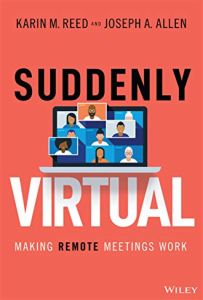Join getAbstract to access the summary!

Join getAbstract to access the summary!
Joseph Allen and Karin Reed
Suddenly Virtual
Making Remote Meetings Work
Wiley, 2021
What's inside?
Remote meetings require fresh skills and expertise.
Recommendation
Due to the pandemic, many white-collar employees now work from home. To collaborate, they must meet remotely. Co-authors Karin M. Reed and Joseph A. Allen explain the best way to organize and facilitate virtual meetings. Interestingly, Reed and Allen have never met face-to-face. They conducted all their co-authoring coordination virtually – concrete proof of how well remote meetings and online collaboration can work when all the elements come together.
Summary
About the Authors
Karin M. Reed is the CEO of Speaker Dynamics, a corporate-communications-training firm. Joseph A. Allen, PhD, is a professor of industrial and organizational psychology at the University of Utah.

















Comment on this summary